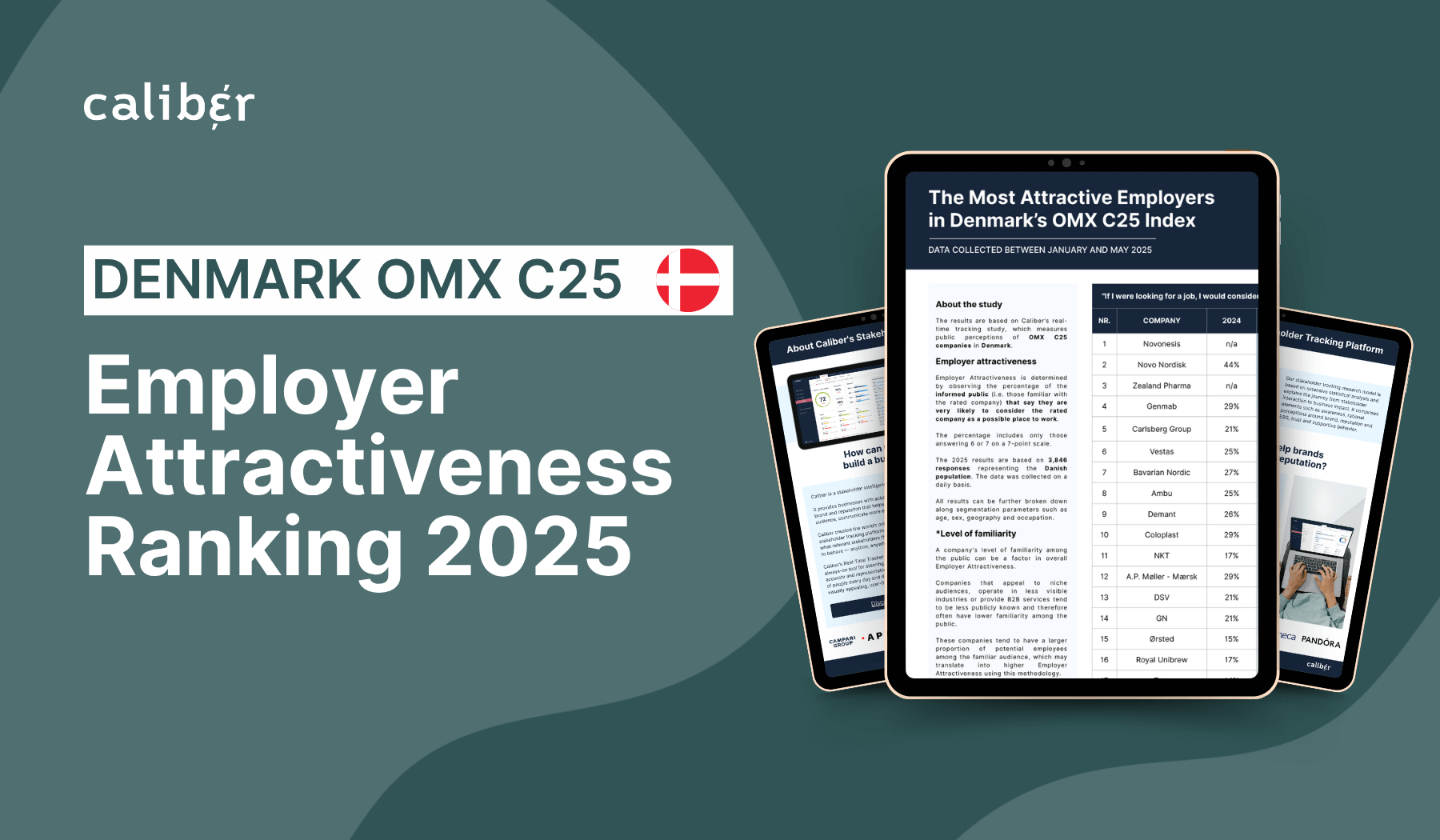

As Q1 2019 has come and gone, it’s that time of year when we rank the Top 100 Danish companies based on public perceptions.
Each quarter, we survey thousands of people across Denmark and calculate the Trust & Like Score of these 100 companies to determine which ones are most reputable – according to stakeholders.
It appears a lot has changed since the release of our 2018 results: Denmark Top 100. E-Boks is no longer Denmark’s favorite company after an unprecedented 6.8-point fall to 7th place.
Opening up the e-postal service to compete with Netcompany’s latest bid (article in Danish) may have caused the Danes to view the service more critically.
It will be interesting to see how e-Boks performs over the next few quarters – will it make its way back to the top or follow the same path as the parent company, PostNord? After a rough 2018 for the toy industry and the closure of Toys R Us, Lego has managed to once again build its way back to 1st place as the most trusted & loved company in Denmark.
The toymaking giant has continued to hold a steady score over the years and a reserved place in the hearts of the Danes. Rema 1000 holds on to 2nd place, remaining the highest-ranking non-Danish company, and is followed by Københavns Lufthavn (Copenhagen Airport) in 3rd place.
Denmark’s main international airport made its first-time debut on the podium perhaps due to last year’s record number of travelers or the continuous improvements turning the airport into a luxurious dining and shopping experience – overall Københavns Lufthavn is on the ascent.
Vestas benefitted from a strong start in the first quarter which led to a 6.7-point rise in perceptions – propelling the company into 4th place and making it Q1’s biggest riser.
At the beginning of 2019, the wind turbine giant not only secured large orders on a global scale but also announced the nomination of former Danish prime minister Helle Thorning-Schmidt to the board.
It appears Vestas could have continued climbing the ranks if it wasn’t for negative news late in the quarter surrounding injuries resulting from unsafe working conditions (article in Danish) at a factory in Spain – eerily resembling a similar circumstance that occurred three years ago here in Denmark.
It will be interesting to see how perceptions develop in Q2 and whether or not Vestas can continue its rise.
Another top mover over Q1 is Denmark’s second-largest brewery, Royal Unibrew, with a rise of 5.5 points. While it appears the brewery sector as a whole is bubbling up, Royal Unibrew’s latest perception gain leaves it only 0.2 points behind Denmark’s largest brewery, Carlsberg – which also made a significant rise of 3.3 points in Q1.
Interestingly, the release of Carlsberg’s new innovative snap pack at the beginning of Q1 wasn’t enough to open a bigger reputational gap over its main competitor.
In the first quarter of 2019, an interesting top riser is one of the world’s leading facility services companies, ISS.
With a gain of 4.4 points, the reputation of ISS is indeed being polished. The increase in public perceptions could be due to CEO Jeff Gravenhorst’s interview (article in Danish) with Børsen at the beginning of the year.
As political debates became heated over government policies, Jeff Gravenhorst took the opportunity to speak his mind and spoke from the heart. In a world with increasing political correctness, perhaps ISS’ rise is a sign of the public positively receiving a breath of authenticity. After all, this is how CEO activism works best.
Unilever is typically known for championing environmental protection, but it seems to have been off to a bad start in 2019 with an 8.5-point drop over Q1.
Greenpeace’s article portraying Unilever as one of the top plastic polluters in the Philippines could be the reason affecting public trust – especially when it comes to brand integrity (indeed another big faller was Nestlé, also criticized by Greenpeace).
As the conglomerate continues to tackle single-use plastics, it will be interesting to see where perceptions lead.
German Aldi also seems to have been struggling in Q1. The German supermarket chain fell 8.0 points to seal its place as Denmark’s least trusted and liked grocery store. Perhaps Aldi’s product offering isn’t what Danes are looking for.
Danish consumers appear to be preferential towards ecological-centric selections – a product strategy (article in Danish) adopted by competitor Lidl, who now leads by 8.9 points. It will be interesting to see if Aldi adopts a new strategy and whether or not it will help to increase perceptions.
Flying Tiger experienced a 7.1-point drop after a story from TV2 Lorry went viral (article in Danish). A local man found box after box of unopened glasses, bags, calendars, iPhone covers, notebooks, and more in a dumpster belonging to Flying Tiger in Copenhagen.
Many have refused to set foot inside a Flying Tiger store again as this oversight displayed a corporate “indifference to nature, the environment, and the future generations.”
As resources become more scarce and the effects of climate change more real, the public’s expectations of businesses are growing – and resource waste on this level is less likely to go unnoticed.
A few rather surprising top movers in the first quarter of 2019 came from the financial industry. Our 2018 industry ranking revealed that the banking and financial sector isn’t anywhere near the top of the list, but our global finance study identified that perceptions are slowly improving.
It appears the rather infamous Danske Bank is starting to recover with a gain of 6.4 points. Spar Nord Bank is also seeing improvements with a 5.6-point increase.
However, it is now Nykredit (-9.4 points) and Saxo Bank (-8.5 points) that are starting to feel the heat.
Perhaps the elections to the board of representatives of Nykredit’s parent company and the resulting drop in probability for a decrease of mortgage admin fees could be to blame for the former – while Saxo Bank’s latest offer for BinckBank may explain the latter.
In any case, it seems that perceptions are averaging for all players across the financial industry.
The beginning of 2019 was eventful with some surprising reputational outcomes – with the likes of ISS’ CEO activism and Flying Tiger’s resource waste, and all the way down to Aldi’s product and Unilever’s packaging choices, Q1 2019 has had a lot of lessons to offer.
Consumer expectations are constantly changing, and the companies that keep track seem to stay ahead of the pack.

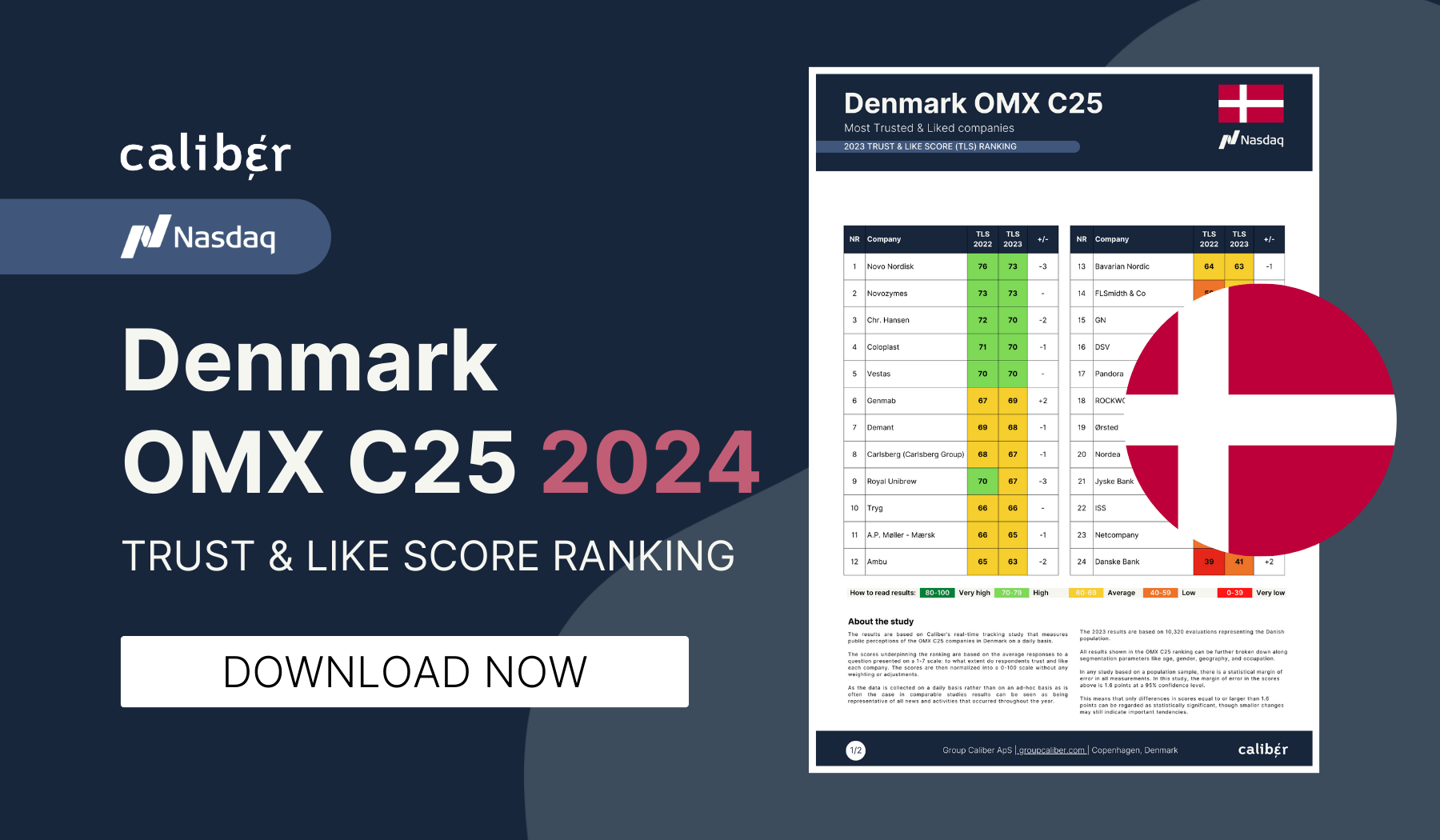
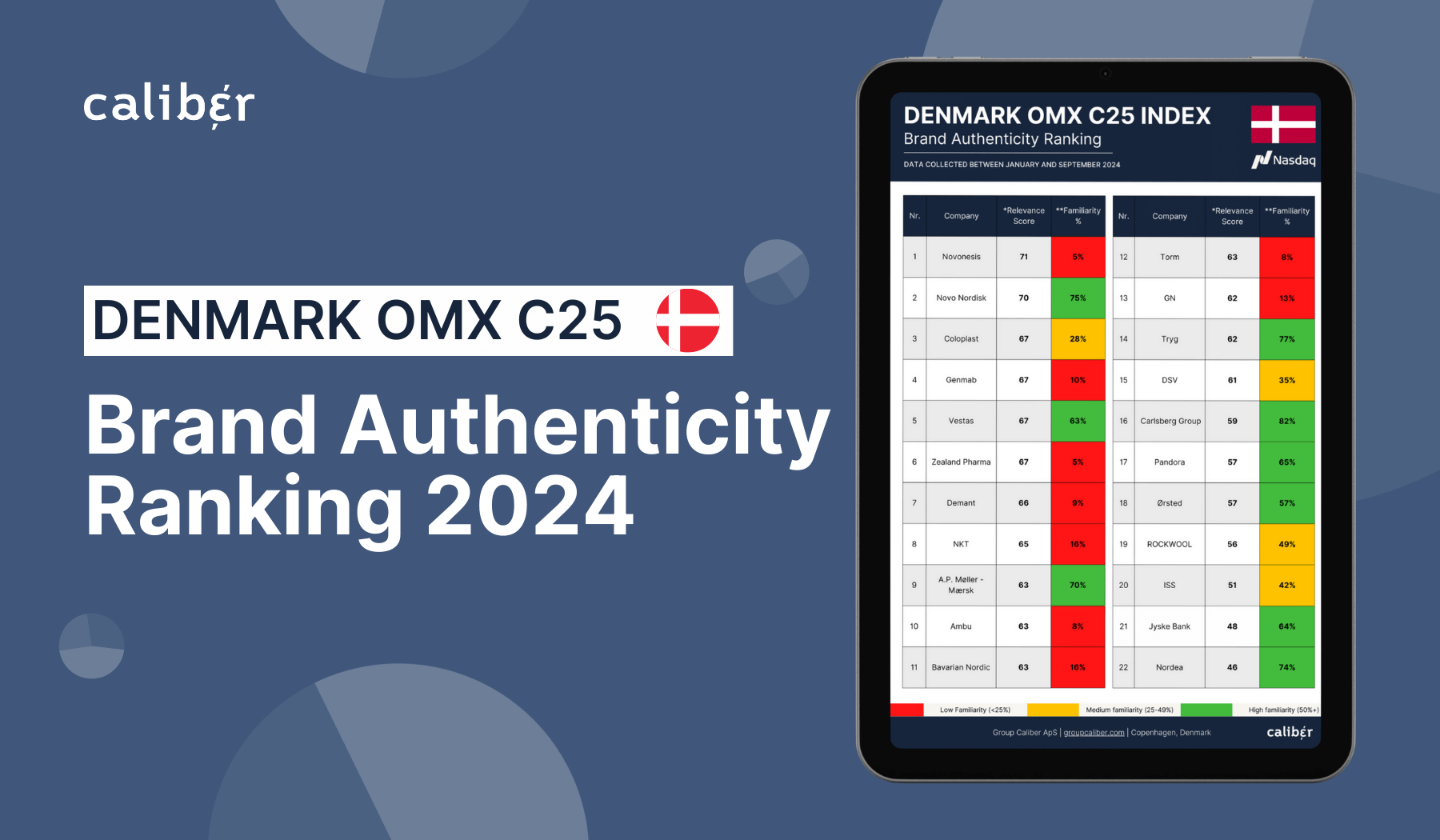
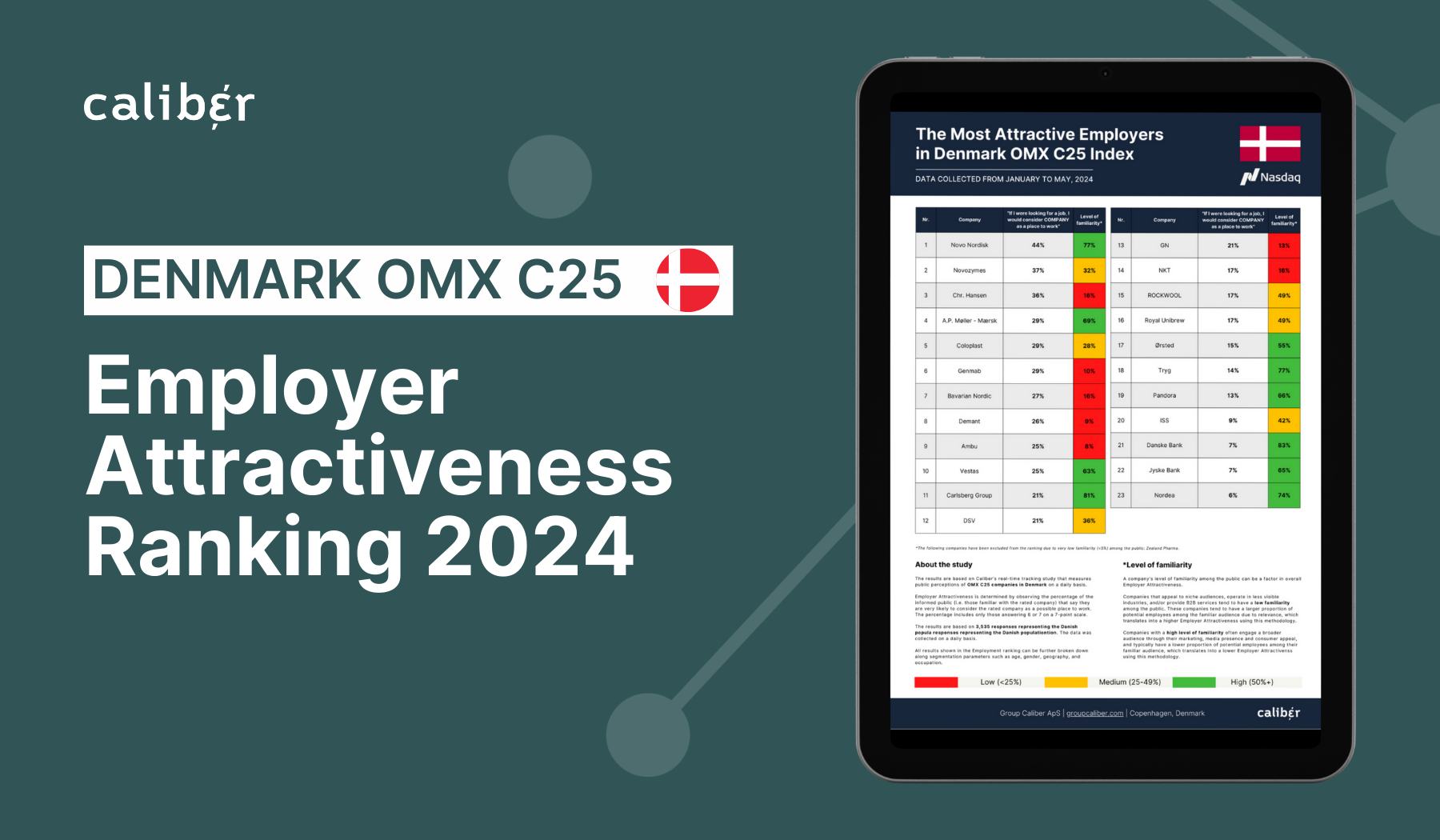
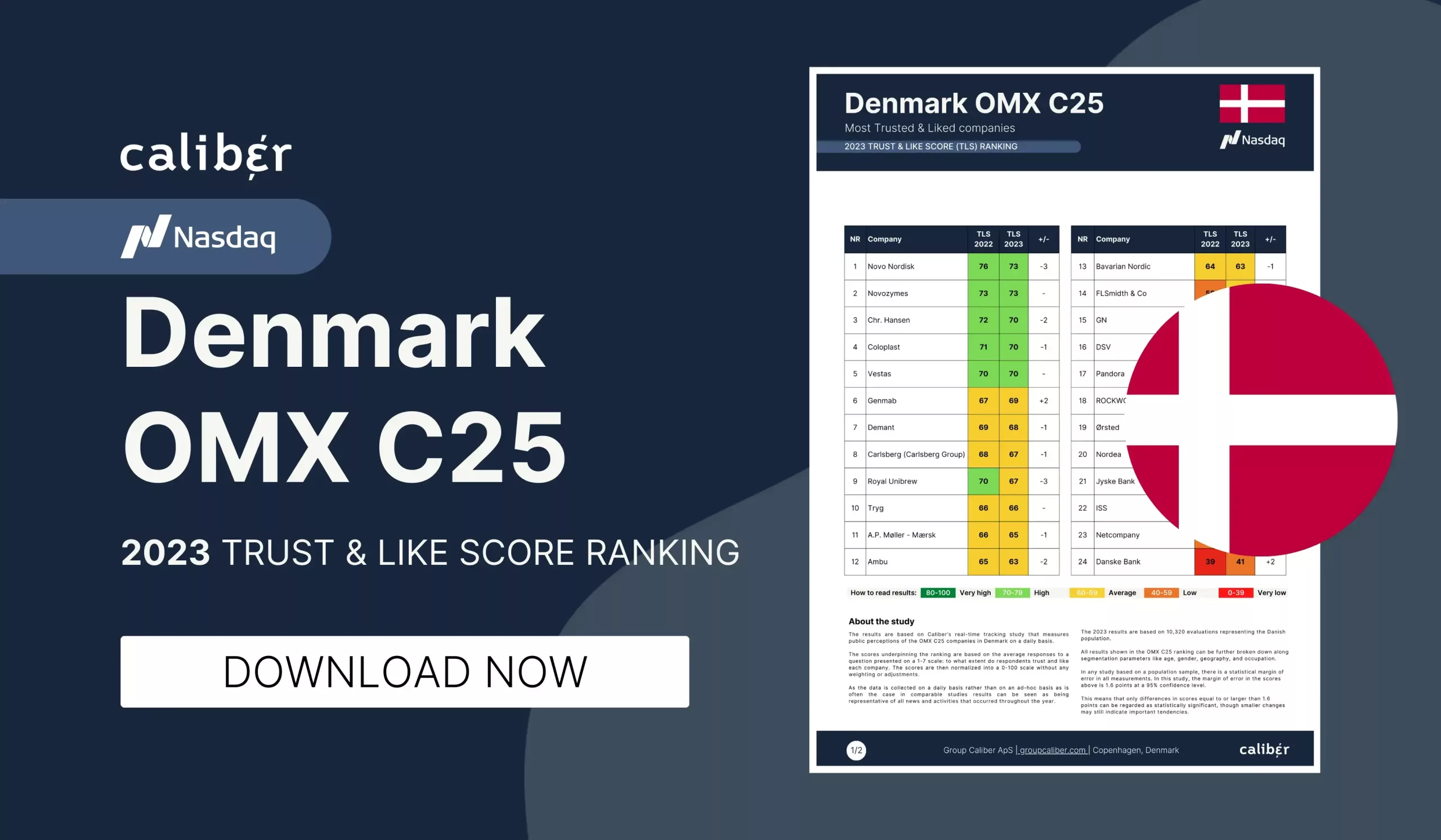

© 2024 Group Caliber | All Rights Reserved | VAT: DK39314320